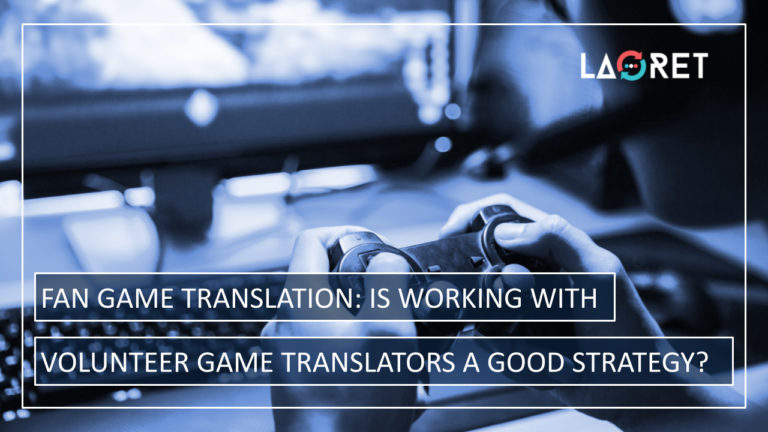Fan Game Translation: Is Working With Volunteer Game Translators A Good Strategy?
Are you setting up the localization of your game into a new market? Then you may be wondering if you will benefit most from volunteer game translation or the work of professionals. There are quite a few considerations that go into it.
So, let us get started straight away and show you the pros and cons of fan game translation, and share some insights into what you should expect when deciding to accept help from volunteers, or even how you can combine it with professional contributions.
What Are The Benefits Of Fan Game Translation?
Fan or volunteer translation is a translation project that is achieved through the help of volunteers who translate the game into their native language. These translators can be either amateurs or professionals. Some would like to contribute to a project to enrich their portfolio, and others may be professionals wanting to be part of their favorite game’s success.
So, what are some of the perks of working with volunteer game translators? Think about your reason for translating your game. Of course, you want to reach new markets. But you also understand that the gaming community is a very loyal and very passionate one. Gaming is one of those pastimes created to immerse the gamer into a new world. And if there is anything that will rob them of the opportunity to fully enjoy the game, they will also be vocal about it.
So, here are the benefits of working with a volunteer game translator:
- They will be hardcore players who are familiar with the game. They will have played this game or similar ones themselves and will understand what will make the translation work.
- Fangame translators possess familiarity with the game combined with a guaranteed passion for the project. This is particularly true when it comes to AAA or Multiplayer Online Role-Playing Game (MMO) since they tend to attract a more passionate crowd.
- Working with volunteers can, of course, save a pretty penny. But in order for this to truly pay off, you will need to make sure that volunteers fit into your production plan. More on this later!

When Will A Professional Team Be Your Best Bet?
Benefits aside, there are downsides to working with volunteers and there will be situations where working with a professional team might be a wiser approach. These can be related to:
- When working with volunteers, you will need to be prepared to implement a flexible timeline with the understanding that they will not be able to commit fully.
- Since games need to be launched on time to be successful, developers usually implement an agile approach to game development so the process can keep going even after the game’s release. While this could relieve some pressure off of the timeline constraints, deadlines will still need to be met.
- Complex content materials are always best managed when there are Glossaries to follow so that the approved terminology can be implemented, and consistency can be guarded. Since these glossaries are efficiently managed through Translation (CAT) Tools and volunteer translations cannot be expected to work with these, the risk of receiving inconsistent translations or even incomplete strings can pose a problem.
- Since fans are not trained in what type of language could be appropriate, there is a risk of offensive or inappropriate language sneaking into the translation.
- Localization Project Managers will have their work cut out for them in managing volunteers with varying schedules and different or no tools available to them. This means that while you could save money on the volunteers, your managers might have to put in some extra work.
- As we said, many volunteers will want to contribute to a game because they have a passion for it. This means that in order to attract most volunteers, the game may already need to be released.
- Quality Game Translation follows a strict Translation, Editing and Proofreading (TEP) process of the in-game content, store content, and non-string content. Additionally, professional translators and LSPs will have a firm grasp of the best practices involved in video game translation on a linguistic and a technical level.
Pro Tip! What do best practices in video game translation entail and what does the translation and localization process look like exactly? Have a look at our blog on The Best Localization Practices For Your Unity 3D Game. We offer a step-by-step guide on what localization looks like for a Unity 3D game and also give a bunch of tips and resources that can be applied to any type of game.
What If You Mix It Up?
Some might mix and match and use volunteers for in-game translation and professionals for the more complex tasks such as marketing campaigns.
Games need good marketing. The marketing product managers in charge of launching campaigns will find it challenging to run multilingual campaigns with volunteers. Especially because to write effective marketing content, one also needs marketing experience, and industry expertise and knowledge of the target language won’t be enough. The translator will need to have a solid understanding of the brand voice and mission. That is why for marketing specifically, you may want to engage professionals and leave the in-game content to volunteers, if you are so inclined.
Here too, the burden of managing both professionals and volunteers should be considered, and many of the same challenges mentioned above will still apply.
Conclusion
So, will you be working with a volunteer translator or professional ones? The answer to this question will fully depend on your goals, timeline, and resources. Ask yourself if a person’s passion will achieve the goals you are looking for, and if you can accept translations that are not produced with the help of specialized tools.






